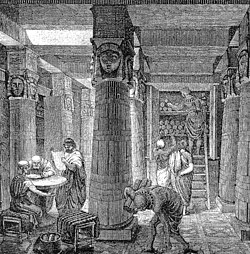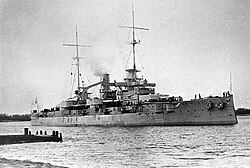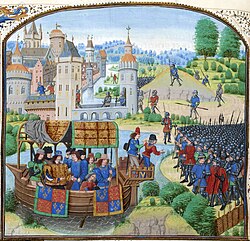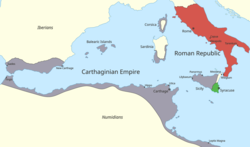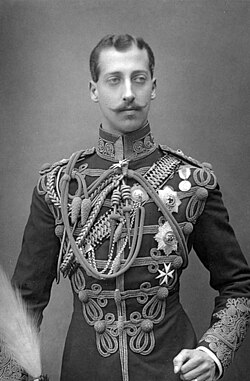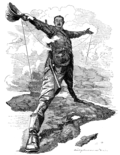Portal:History
The History Portal
History is the systematic study of the past, focusing primarily on the human past. As an academic discipline, it analyses and interprets evidence to construct narratives about what happened and explain why it happened. Some theorists categorize history as a social science, while others see it as part of the humanities or consider it a hybrid discipline. Similar debates surround the purpose of history—for example, whether its main aim is theoretical, to uncover the truth, or practical, to learn lessons from the past. In a more general sense, the term history refers not to an academic field but to the past itself, times in the past, or to individual texts about the past.
Historical research relies on primary and secondary sources to reconstruct past events and validate interpretations. Source criticism is used to evaluate these sources, assessing their authenticity, content, and reliability. Historians strive to integrate the perspectives of several sources to develop a coherent narrative. Different schools of thought, such as positivism, the Annales school, Marxism, and postmodernism, have distinct methodological approaches.
History is a broad discipline encompassing many branches. Some focus on specific time periods, such as ancient history, while others concentrate on particular geographic regions, such as the history of Africa. Thematic categorizations include political history, military history, social history, and economic history. Branches associated with specific research methods and sources include quantitative history, comparative history, and oral history.
History emerged as a field of inquiry in antiquity to replace myth-infused narratives, with influential early traditions originating in Greece, China, and later in the Islamic world. Historical writing evolved throughout the ages and became increasingly professional, particularly during the 19th century, when a rigorous methodology and various academic institutions were established. History is related to many fields, including historiography, philosophy, education, and politics. (Full article...)
Featured picture
Did you know (auto generated)

- ... that West Auckland is home to the largest stratovolcano in the geologic history of New Zealand?
- ... that Nakba denial is a form of historical negationism pertaining to the 1948 Palestinian expulsion and flight?
- ... that The Use and Abuse of History: Or How the Past Is Taught explores how school textbooks across the world distort history to serve political interests?
- ... that Seattle Reign FC have had three name changes during their 11-year history?
- ... that Gary Tuggle, as head of Philadelphia's Drug Enforcement Administration division, led potentially the largest prepackaged heroin seizure in Delaware history?
- ... that Songs and Flowers of the Wasatch represented a shift in Mormon history toward a "socially-accepted American cultural and religious heritage", according to historian Jennifer Reeder?

Jürgen Ehlers (German: [ˈjʏʁɡn̩ ˈʔeːlɐs]; 29 December 1929 – 20 May 2008) was a German physicist who contributed to the understanding of Albert Einstein's theory of general relativity. From graduate and postgraduate work in Pascual Jordan's relativity research group at Hamburg University, he held various posts as a lecturer and, later, as a professor before joining the Max Planck Institute for Astrophysics in Munich as a director. In 1995, he became the founding director of the newly created Max Planck Institute for Gravitational Physics in Potsdam, Germany.
Ehlers' research focused on the foundations of general relativity as well as on the theory's applications to astrophysics. He formulated a suitable classification of exact solutions to Einstein's field equations and proved the Ehlers–Geren–Sachs theorem that justifies the application of simple, general-relativistic model universes to modern cosmology. He created a spacetime-oriented description of gravitational lensing and clarified the relationship between models formulated within the framework of general relativity and those of Newtonian gravity. In addition, Ehlers had a keen interest in both the history and philosophy of physics and was an ardent populariser of science. (Full article...)
On this day
April 30: Yom HaZikaron in Israel (2025)
- 311 – The Diocletianic Persecution of Christians officially ended in the eastern Roman Empire.
- 1943 – Second World War: The Royal Navy submarine HMS Seraph began Operation Mincemeat to deceive Germany about the upcoming invasion of Sicily.
- 1963 – A refusal by the Bristol Omnibus Company and the Transport and General Workers' Union to permit the employment of black bus crews led to a bus boycott in Bristol, England.
- 1975 – American forces completed a helicopter evacuation (aircraft and evacuees pictured) of U.S. citizens, South Vietnamese civilians and others from Saigon, just before North Vietnamese troops captured the city and ended the Vietnam War.
- 2021 – A crowd crush killed 45 people during the annual pilgrimage to the tomb of Rabbi Shimon bar Yochai in Israel.
- Marie of the Incarnation (d. 1672)
- Emily Stowe (d. 1903)
- Kirsten Dunst (b. 1982)
Selected quote
Those who would give up Essential Liberty to purchase a little Temporary Safety, deserve neither Liberty nor Safety.
— Benjamin Franklin, American statesman
Related portals
More Did you know...
- ... that in 1898, the United States government annexed the Kingdom of Hawaii despite protestation from Queen Liliuokalani (pictured)?
- ... that Jean Thurel was a soldier in the French Régiment de Touraine for more than 75 years?
- ... that the severed head of Julia Martha Thomas — murdered, boiled and dismembered by her maid in 1879 — was found next door to Sir David Attenborough's house in 2010?
- ... that the 18th-century Indian automaton Tipu's Tiger shows a near life-size European being mauled by a tiger, and emits wails and grunts as well as containing a pipe organ?
- ... that Svið, a traditional Icelandic dish, consists of a sheep's head that has been cut in half, singed, and boiled with the brain removed?
- ... that, despite overseeing the construction of the crematoria and gas chambers at Auschwitz, what specifically shocked SS-Obersturmführer Robert Mulka at the camp was his colleagues' dress sense?
- ... that Tsar Alexander II of Russia had a special crystal bottle of Roederer champagne made for the Three Emperors Dinner in 1867 so that he could admire the bubbles?
- ... that the Gudea cylinders are the longest literary composition ever found in the Sumerian language?
Topics
Categories

History • By period • By region • By topic • By ethnic group • Historiography • Archaeology • Books • Maps • Images • Magazines • Organizations • Fictional • Museums • Pseudohistory • Stubs • Timelines • Chronology • People • Wikipedia historians
WikiProjects
![]() WikiProject History •
Ancient Near East • Australian History • Classical Greece and Rome • Dacia • Former countries • History of Canada • Chinese history • European history • Heraldry and vexillology • Indian history • Jewish history • Medieval Scotland • Mesoamerica • Military history • Middle Ages • History of Science
WikiProject History •
Ancient Near East • Australian History • Classical Greece and Rome • Dacia • Former countries • History of Canada • Chinese history • European history • Heraldry and vexillology • Indian history • Jewish history • Medieval Scotland • Mesoamerica • Military history • Middle Ages • History of Science
WikiProject Time • Days of the Year • Years
WikiProject Biography • Composers • Political figures • Saints • United States Presidents
Things you can do
 |
Here are some tasks awaiting attention:
|
Associated Wikimedia
The following Wikimedia Foundation sister projects provide more on this subject:
-
Commons
Free media repository -
Wikibooks
Free textbooks and manuals -
Wikidata
Free knowledge base -
Wikinews
Free-content news -
Wikiquote
Collection of quotations -
Wikisource
Free-content library -
Wikiversity
Free learning tools -
Wiktionary
Dictionary and thesaurus

